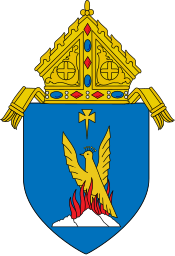Diocese of Phoenix
|
Diocese of Phoenix Dioecesis Phoenicensis |
|
|---|---|
 |
|
| Location | |
| Country | United States |
| Territory | Arizona counties of Maricopa, Mohave, Yavapai, and Coconino (excluding the territorial boundaries of the Navajo Indian Reservation), and also includes the Gila River Indian Reservation in Pinal County |
| Ecclesiastical province | Santa Fe |
| Deaneries | 7 |
| Coordinates | 33°27′0″N 112°4′0″W / 33.45000°N 112.06667°W |
| Statistics | |
| Area | 43,967 sq mi (113,870 km2) |
| Population - Total - Catholics |
(as of 2013) 4,598,000 833,000 (18.1%) |
| Parishes | 92 & 23 missions |
| Churches | 114 |
| Schools | 35 |
| Information | |
| Denomination | Roman Catholic |
| Rite | Roman Rite |
| Established | December 2, 1969 (47 years ago) |
| Cathedral | Cathedral of Saints Simon and Jude |
| Patron saint | Our Lady of Guadalupe |
| Secular priests | 143 |
| Current leadership | |
| Pope | Francis |
| Bishop | Bishop of Phoenix |
| Metropolitan Archbishop |
John Charles Wester Archbishop of Santa Fe |
| Auxiliary Bishops | Eduardo Alanis Nevares |
| Emeritus Bishops | Thomas Joseph O'Brien |
| Map | |
 Diocese of Phoenix, Arizona |
|
| Website | |
| diocesephoenix.org | |
Coordinates: 33°27′0″N 112°4′0″W / 33.45000°N 112.06667°W
The Roman Catholic Diocese of Phoenix (Latin: Dioecesis Phoenicensis) in Arizona is a particular church of the Roman Catholic Church in the United States. It was established on December 2, 1969 when it was split off from the Diocese of Tucson. Its ecclesiastic territory includes Maricopa, Mohave, Yavapai, and Coconino counties (excluding the territorial boundaries of the Navajo Indian Reservation), and also includes the Gila River Indian Reservation in Pinal County. The bishop is Thomas Olmsted.
The official description found in an earlier version of the website of the diocese read as follows: "These arms are composed of a blue field on which is placed a silver (white) mountain to represent Camelback Mountain, a significant aspect of the backdrop of the See City. Arising from the mountain as a gold (yellow) bird that is coming forth from red flames to represent the mythological phoenix, that arose from the ashes, and for which the See City of Phoenix is named. Above the phoenix is a gold "cross formy fitchée (three arms of a cross and one resembling a spike), which is taken from the arms of the Diocese of Tucson to signify that it was from the territory of Tucson that the Diocese of Phoenix was carved in 1969."
...
Wikipedia

